Deck 11: Calculations for Special Populations
سؤال
سؤال
سؤال
سؤال
سؤال
سؤال
سؤال
سؤال
سؤال
سؤال
سؤال
سؤال
سؤال
سؤال
سؤال
سؤال
سؤال
سؤال
سؤال
سؤال
سؤال
سؤال
سؤال
سؤال
سؤال
سؤال
سؤال
سؤال
سؤال
سؤال
سؤال
سؤال
سؤال
سؤال
سؤال
سؤال
سؤال
سؤال
سؤال
سؤال
سؤال
سؤال
سؤال
سؤال
سؤال
سؤال
سؤال
سؤال
سؤال
سؤال
سؤال
سؤال
سؤال
سؤال
سؤال
سؤال
سؤال
سؤال
سؤال
سؤال
سؤال
سؤال
سؤال
سؤال
سؤال
سؤال
سؤال
سؤال
سؤال
سؤال
سؤال
سؤال
سؤال
سؤال
سؤال
سؤال
سؤال
سؤال
سؤال
سؤال

فتح الحزمة
قم بالتسجيل لفتح البطاقات في هذه المجموعة!
Unlock Deck
Unlock Deck
1/136
العب
ملء الشاشة (f)
Deck 11: Calculations for Special Populations
1
You are working in a pediatric ICU where your patient is a 3-year-old boy who has a staphylococcal skin infection in the area surrounding his incision. His attending physician has prescribed the following treatment. You know from his chart that he weighs 40 lb.
Ordered: Rocephin 600 mg IV over 30 min bid
On hand: Refer to label H. According to the package insert, for pediatric patients with skin infections, the recommended total daily dose is 50 to 75 mg/kg/day given once a day (or in equally divided doses twice a day).
The total daily dose should not exceed 2 g. The Rocephin is reconstituted to a dosage strength of 40 mg/mL.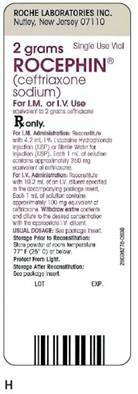
Figure 11-13
Calculate the flow rate for the infusion pump used to deliver this order.
Ordered: Rocephin 600 mg IV over 30 min bid
On hand: Refer to label H. According to the package insert, for pediatric patients with skin infections, the recommended total daily dose is 50 to 75 mg/kg/day given once a day (or in equally divided doses twice a day).
The total daily dose should not exceed 2 g. The Rocephin is reconstituted to a dosage strength of 40 mg/mL.

Figure 11-13
Calculate the flow rate for the infusion pump used to deliver this order.
To find the flow rate for the infusion pump used to deliver the order.
Ordered and refer to label H.
and refer to label H.
Formula used:
The formula is .
.
Where, is volume that expressed in millilitres and
is volume that expressed in millilitres and  is time that expressed in hours and
is time that expressed in hours and  is flow rate.
is flow rate.
Volume Time
Time  Label H:
Label H: 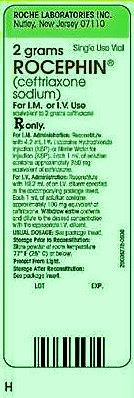 To convert the volume of ordered dosage to milliliters, multiply
To convert the volume of ordered dosage to milliliters, multiply  with
with  .
.  To convert the time to hours, divide
To convert the time to hours, divide  by
by  .
.  To find the flow rate., use the formula
To find the flow rate., use the formula  .
.
Substitute for
for  and
and  for
for  in formula
in formula  .
.  Hence, the flow rate for the infusion pump used to deliver the order is
Hence, the flow rate for the infusion pump used to deliver the order is  .
.
The required solution is Thus, the required result is found.
Thus, the required result is found.
Ordered
 and refer to label H.
and refer to label H.Formula used:
The formula is
 .
.Where,
 is volume that expressed in millilitres and
is volume that expressed in millilitres and  is time that expressed in hours and
is time that expressed in hours and  is flow rate.
is flow rate.Volume
 Time
Time  Label H:
Label H:  To convert the volume of ordered dosage to milliliters, multiply
To convert the volume of ordered dosage to milliliters, multiply  with
with  .
.  To convert the time to hours, divide
To convert the time to hours, divide  by
by  .
.  To find the flow rate., use the formula
To find the flow rate., use the formula  .
.Substitute
 for
for  and
and  for
for  in formula
in formula  .
.  Hence, the flow rate for the infusion pump used to deliver the order is
Hence, the flow rate for the infusion pump used to deliver the order is  .
.The required solution is
 Thus, the required result is found.
Thus, the required result is found. 2
In Exercises 7, calculate the BSA for patients with the following heights and weights
41 in and 33 lb
41 in and 33 lb

3
In Exercises 15, determine if the order is safe. If it is, then determine the amount to administer.
The patient is a 25-kg child receiving myelosuppressive chemotherapy. Ordered: Neupogen 125 mcg IVPB over 30 min
On hand: Refer to label D. According to the package insert, for patients receiving myelosuppressive hemotherapy, the recommended daily starting dose is 5 mcg/kg/day, administered as a single daily injection by Sub-Q bolus injection, by short IV infusion (15 to 30 min), or by continuous Sub-Q or continuous IV infusion.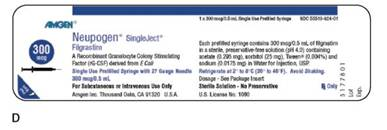
In Exercises 16-18, calculate the daily maintenance fluid needs, based on the following weights. Then find the flow rate in milliliters per hour ( F ) for the DMFN.
The patient is a 25-kg child receiving myelosuppressive chemotherapy. Ordered: Neupogen 125 mcg IVPB over 30 min
On hand: Refer to label D. According to the package insert, for patients receiving myelosuppressive hemotherapy, the recommended daily starting dose is 5 mcg/kg/day, administered as a single daily injection by Sub-Q bolus injection, by short IV infusion (15 to 30 min), or by continuous Sub-Q or continuous IV infusion.

In Exercises 16-18, calculate the daily maintenance fluid needs, based on the following weights. Then find the flow rate in milliliters per hour ( F ) for the DMFN.
 The dose is safe.
The dose is safe.  A = 0.21 mL
A = 0.21 mL 4
74 lb

فتح الحزمة
افتح القفل للوصول البطاقات البالغ عددها 136 في هذه المجموعة.
فتح الحزمة
k this deck
5
The patient is a 91-lb child receiving myelosuppressive chemotherapy.
Ordered: Neupogen 200 mcg IVPB over 30 minutes
On hand: A 1-mL single-dose vial of Neupogen with 300 mcg/1 mL
According to the package insert, for patients receiving myelosuppressive chemotherapy, the recommended daily starting dose is 5 mcg/kg/day, administered as a single daily injection by SC bolus injection, by short IV infusion (15 to 30 minutes), or by continuous SC or continuous IV infusion.
Ordered: Neupogen 200 mcg IVPB over 30 minutes
On hand: A 1-mL single-dose vial of Neupogen with 300 mcg/1 mL
According to the package insert, for patients receiving myelosuppressive chemotherapy, the recommended daily starting dose is 5 mcg/kg/day, administered as a single daily injection by SC bolus injection, by short IV infusion (15 to 30 minutes), or by continuous SC or continuous IV infusion.

فتح الحزمة
افتح القفل للوصول البطاقات البالغ عددها 136 في هذه المجموعة.
فتح الحزمة
k this deck
6
In Exercises 8, convert the following weights to kilograms. Rounding to the nearest hundredth.
11 lb 10 oz
11 lb 10 oz

فتح الحزمة
افتح القفل للوصول البطاقات البالغ عددها 136 في هذه المجموعة.
فتح الحزمة
k this deck
7
In Exercises 2, use the appropriate formula to calculate the BSA for patients with the following heights and weights.
58 cm and 21 kg
58 cm and 21 kg

فتح الحزمة
افتح القفل للوصول البطاقات البالغ عددها 136 في هذه المجموعة.
فتح الحزمة
k this deck
8
In Exercises 18, determine if the order is safe. If so, calculate the amount to administer.
The patient is 63 in. tall and weighs 125 lb.
Ordered: Cisplatin 125 mg IV every four weeks
On hand: Refer to label B. The usual dose is 75 to 100 mg/m 2.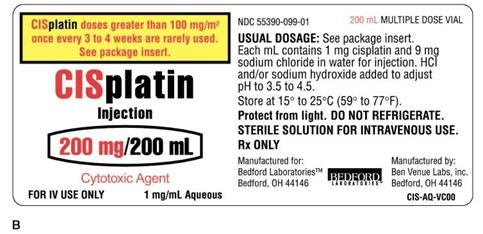
The patient is 63 in. tall and weighs 125 lb.
Ordered: Cisplatin 125 mg IV every four weeks
On hand: Refer to label B. The usual dose is 75 to 100 mg/m 2.


فتح الحزمة
افتح القفل للوصول البطاقات البالغ عددها 136 في هذه المجموعة.
فتح الحزمة
k this deck
9
In Exercises 16, determine if the dosage ordered is safe.
The patient: 79-year-old female, 5 ft tall, 110 lb, CL CR of 90 mL/min, and normal renal function. Patient is within ideal weight range.
Ordered: Vancocin HCI 0.5 g IV q6h
See Exercise 15 above for information about the recommended daily dosage.
The patient: 79-year-old female, 5 ft tall, 110 lb, CL CR of 90 mL/min, and normal renal function. Patient is within ideal weight range.
Ordered: Vancocin HCI 0.5 g IV q6h
See Exercise 15 above for information about the recommended daily dosage.

فتح الحزمة
افتح القفل للوصول البطاقات البالغ عددها 136 في هذه المجموعة.
فتح الحزمة
k this deck
10
You are preparing medication for two patients. Patient A has nosocomial pneumonia and a Creatinine Clearance of 37 mL/min. He has been ordered Zosyn 4.5 gram q6h IV. Patient B has pelvic inflammatory disease and a normal creatinine clearance. She has been ordered 3.375 gram IV q6h. You have the following Zosyn medication vials (see labels E, F, and G.) and package insert information. 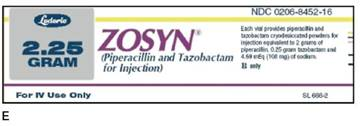

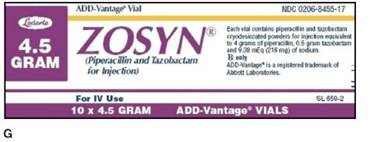
If safe, what medication will you use and how will you prepare the medication.



If safe, what medication will you use and how will you prepare the medication.

فتح الحزمة
افتح القفل للوصول البطاقات البالغ عددها 136 في هذه المجموعة.
فتح الحزمة
k this deck
11
Answer the following questions.
Explain the difference between daily maintenance fluids and replacement fluids.
Explain the difference between daily maintenance fluids and replacement fluids.

فتح الحزمة
افتح القفل للوصول البطاقات البالغ عددها 136 في هذه المجموعة.
فتح الحزمة
k this deck
12
Answer the following questions.
Calculate the safe IM dosage range for a 3-week-old infant weighing 6 pounds 12 ounces. See label C and package insert information.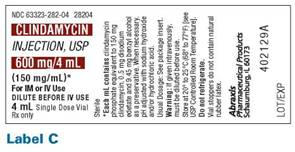
Calculate the safe IM dosage range for a 3-week-old infant weighing 6 pounds 12 ounces. See label C and package insert information.


فتح الحزمة
افتح القفل للوصول البطاقات البالغ عددها 136 في هذه المجموعة.
فتح الحزمة
k this deck
13
10 lb 2 oz

فتح الحزمة
افتح القفل للوصول البطاقات البالغ عددها 136 في هذه المجموعة.
فتح الحزمة
k this deck
14
The child weighs 59 lb.
Ordered: Biaxin susp 200 mg po q12h x 10 days
On hand: Biaxin Granules, 250 mg/5 mL, oral suspension
According to the package insert, the usual recommended daily dosage for children is 15 mg/kg/day for 10 days.
Ordered: Biaxin susp 200 mg po q12h x 10 days
On hand: Biaxin Granules, 250 mg/5 mL, oral suspension
According to the package insert, the usual recommended daily dosage for children is 15 mg/kg/day for 10 days.

فتح الحزمة
افتح القفل للوصول البطاقات البالغ عددها 136 في هذه المجموعة.
فتح الحزمة
k this deck
15
In Exercises 9, convert the following weights to kilograms. Rounding to the nearest hundredth.
9 lb 14 oz
9 lb 14 oz

فتح الحزمة
افتح القفل للوصول البطاقات البالغ عددها 136 في هذه المجموعة.
فتح الحزمة
k this deck
16
In Exercises 3, use the appropriate formula to calculate the BSA for patients with the following heights and weights.
38 cm and 6 kg
38 cm and 6 kg

فتح الحزمة
افتح القفل للوصول البطاقات البالغ عددها 136 في هذه المجموعة.
فتح الحزمة
k this deck
17
In Exercises 1, calculate the daily maintenance fluid needs, based on the following weights.
8 kg
8 kg

فتح الحزمة
افتح القفل للوصول البطاقات البالغ عددها 136 في هذه المجموعة.
فتح الحزمة
k this deck
18
In Exercises 17, determine if the dosage ordered is safe. Then find the amount to administer.
The patient: 75-year-old female, 5 ft 3 in. tall, 198 lb, CL CR of 56 mL/min, diagnosed with hypertension and renal impairment. Ideal weight should be 152 lb.
Ordered: Vasotec 2.5 mg po qd
On hand: Vasotec 5-mg scored tablets
According to the package insert, the usual dose for patients with normal renal function (over 80 mL/min creatinine clearance) is 5 mg/day; for mild impairment (over 30 and up to 80 mL/min), 5 mg/day; for moderate to severe impairment (30 or less mL/min), 2.5 mg/day.
The patient: 75-year-old female, 5 ft 3 in. tall, 198 lb, CL CR of 56 mL/min, diagnosed with hypertension and renal impairment. Ideal weight should be 152 lb.
Ordered: Vasotec 2.5 mg po qd
On hand: Vasotec 5-mg scored tablets
According to the package insert, the usual dose for patients with normal renal function (over 80 mL/min creatinine clearance) is 5 mg/day; for mild impairment (over 30 and up to 80 mL/min), 5 mg/day; for moderate to severe impairment (30 or less mL/min), 2.5 mg/day.

فتح الحزمة
افتح القفل للوصول البطاقات البالغ عددها 136 في هذه المجموعة.
فتح الحزمة
k this deck
19
Answer the following questions.
Name two special populations of patients who require extra consideration when calculating medication dosages.
Name two special populations of patients who require extra consideration when calculating medication dosages.

فتح الحزمة
افتح القفل للوصول البطاقات البالغ عددها 136 في هذه المجموعة.
فتح الحزمة
k this deck
20
In Exercises 8, calculate the BSA for patients with the following heights and weights
30 in and 23 lb
30 in and 23 lb

فتح الحزمة
افتح القفل للوصول البطاقات البالغ عددها 136 في هذه المجموعة.
فتح الحزمة
k this deck
21
In Exercises 16, calculate the daily maintenance fluid needs, based on the following weights. Then find the flow rate in milliliters per hour ( F ) for the DMFN.
24 kg
24 kg

فتح الحزمة
افتح القفل للوصول البطاقات البالغ عددها 136 في هذه المجموعة.
فتح الحزمة
k this deck
22
8 lb 15 oz

فتح الحزمة
افتح القفل للوصول البطاقات البالغ عددها 136 في هذه المجموعة.
فتح الحزمة
k this deck
23
The child weighs 30 lb.
Ordered: Nebcin 22 mg IM q6h
On hand: Nebcin multidose vial, 20 mg/2 mL
According to the package insert, a pediatric patient may be given from 6 to 7.5 mg/kg/day in 3 or 4 equally divided doses.
Ordered: Nebcin 22 mg IM q6h
On hand: Nebcin multidose vial, 20 mg/2 mL
According to the package insert, a pediatric patient may be given from 6 to 7.5 mg/kg/day in 3 or 4 equally divided doses.

فتح الحزمة
افتح القفل للوصول البطاقات البالغ عددها 136 في هذه المجموعة.
فتح الحزمة
k this deck
24
In Exercises 10, convert the following weights to kilograms. Rounding to the nearest hundredth.
14 lb 5 oz
14 lb 5 oz

فتح الحزمة
افتح القفل للوصول البطاقات البالغ عددها 136 في هذه المجموعة.
فتح الحزمة
k this deck
25
In Exercises 4, use the appropriate formula to calculate the BSA for patients with the following heights and weights.
48 cm and 10 kg
48 cm and 10 kg

فتح الحزمة
افتح القفل للوصول البطاقات البالغ عددها 136 في هذه المجموعة.
فتح الحزمة
k this deck
26
In Exercises 2, calculate the daily maintenance fluid needs, based on the following weights.
33 kg
33 kg

فتح الحزمة
افتح القفل للوصول البطاقات البالغ عددها 136 في هذه المجموعة.
فتح الحزمة
k this deck
27
In Exercises 18, determine if the dosage ordered is safe. Then find the amount to administer.
The patient: 81-year-old male, 5 ft tall, 138 lb, CL CR of 63 mL/min, and renal impairment. Patient is within ideal weight range.
Ordered: Ticarcillin 2 g IV q4h
On hand: Ticar 1-g vial, 200 mg/mL when reconstituted
According to the package insert, the usual dose, after the initial loading dose, for patients with infections complicated by renal insufficiency, is 3 g q4h with creatinine clearance over 60 mL/min; 2 g q4h for 30 to 60 mL/min; 2 g q8h for 10 to 30 mL/min; 2 g q12h for less than 10 mL/min; other amounts for patients with complications.
The patient: 81-year-old male, 5 ft tall, 138 lb, CL CR of 63 mL/min, and renal impairment. Patient is within ideal weight range.
Ordered: Ticarcillin 2 g IV q4h
On hand: Ticar 1-g vial, 200 mg/mL when reconstituted
According to the package insert, the usual dose, after the initial loading dose, for patients with infections complicated by renal insufficiency, is 3 g q4h with creatinine clearance over 60 mL/min; 2 g q4h for 30 to 60 mL/min; 2 g q8h for 10 to 30 mL/min; 2 g q12h for less than 10 mL/min; other amounts for patients with complications.

فتح الحزمة
افتح القفل للوصول البطاقات البالغ عددها 136 في هذه المجموعة.
فتح الحزمة
k this deck
28
In Exercises 2, convert the following weights to kilograms.
61 lb
61 lb

فتح الحزمة
افتح القفل للوصول البطاقات البالغ عددها 136 في هذه المجموعة.
فتح الحزمة
k this deck
29
Answer the following questions.
What type of medication is strongly bound to lean tissue?
What type of medication is strongly bound to lean tissue?

فتح الحزمة
افتح القفل للوصول البطاقات البالغ عددها 136 في هذه المجموعة.
فتح الحزمة
k this deck
30
Answer the following questions.
Calculate the safe IM dosage range for a 3-year-old weighing 33 pounds. See label C and package insert information.
Clindamycin package insert information:
IM, IV (infants 1 month) 3.75-5 mg/kg every 6 hours IM, IV (children 1 month) 5-13.3 mg/kg every 8 hours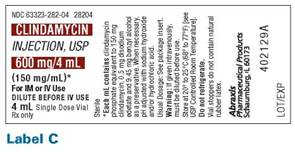
Calculate the safe IM dosage range for a 3-year-old weighing 33 pounds. See label C and package insert information.
Clindamycin package insert information:
IM, IV (infants 1 month) 3.75-5 mg/kg every 6 hours IM, IV (children 1 month) 5-13.3 mg/kg every 8 hours


فتح الحزمة
افتح القفل للوصول البطاقات البالغ عددها 136 في هذه المجموعة.
فتح الحزمة
k this deck
31
In Exercises 5-10, calculate the BSA for patients with the following height and weight.
5. 92 cm and 17 kg
5. 92 cm and 17 kg

فتح الحزمة
افتح القفل للوصول البطاقات البالغ عددها 136 في هذه المجموعة.
فتح الحزمة
k this deck
32
The patient: 79-year-old female, 5? 6? tall, 143 lb, CL CR of 48 mL/min.
Ordered: Cartrol 5 mg PO Q24H
On hand: Cartrol 5 mg/tablet
According to the package insert, the usual dosage interval for 5 mg is as follows: for patients with creatinine clearance above 60 mL/min, 24 hours; for 20 to 60 mL/min, 48 hours; and for less than 20 mL/min, 72 hours.
Ordered: Cartrol 5 mg PO Q24H
On hand: Cartrol 5 mg/tablet
According to the package insert, the usual dosage interval for 5 mg is as follows: for patients with creatinine clearance above 60 mL/min, 24 hours; for 20 to 60 mL/min, 48 hours; and for less than 20 mL/min, 72 hours.

فتح الحزمة
افتح القفل للوصول البطاقات البالغ عددها 136 في هذه المجموعة.
فتح الحزمة
k this deck
33
In Exercises 11, determine if the order is safe. If it is, then determine the amount to administer.
The patient is a 3-day-old newborn who weighs 6 lb 5 oz. Ordered: Nebcin 5 mg IM q12h
On hand: Nebcin multidose vial, 20 mg/2 mL. According to the package insert, a premature or full-term neonate up to 1 week of age may be administered up to 4 mg/kg/day in 2 equal doses every 12 h.
The patient is a 3-day-old newborn who weighs 6 lb 5 oz. Ordered: Nebcin 5 mg IM q12h
On hand: Nebcin multidose vial, 20 mg/2 mL. According to the package insert, a premature or full-term neonate up to 1 week of age may be administered up to 4 mg/kg/day in 2 equal doses every 12 h.

فتح الحزمة
افتح القفل للوصول البطاقات البالغ عددها 136 في هذه المجموعة.
فتح الحزمة
k this deck
34
In Exercises 5, use the appropriate formula to calculate the BSA for patients with the following heights and weights.
52 in and 64 lb
52 in and 64 lb

فتح الحزمة
افتح القفل للوصول البطاقات البالغ عددها 136 في هذه المجموعة.
فتح الحزمة
k this deck
35
In Exercises 3, calculate the daily maintenance fluid needs, based on the following weights.
37 lb
37 lb

فتح الحزمة
افتح القفل للوصول البطاقات البالغ عددها 136 في هذه المجموعة.
فتح الحزمة
k this deck
36
You are working in a pediatric ICU where your patient is a 3-year-old boy who has a staphylococcal skin infection in the area surrounding his incision. His attending physician has prescribed the following treatment. You know from his chart that he weighs 40 lb.
Ordered: Rocephin 600 mg IV over 30 min bid
On hand: Refer to label H. According to the package insert, for pediatric patients with skin infections, the recommended total daily dose is 50 to 75 mg/kg/day given once a day (or in equally divided doses twice a day). The total daily dose should not exceed 2 g. The Rocephin is reconstituted to a dosage strength of 40 mg/mL.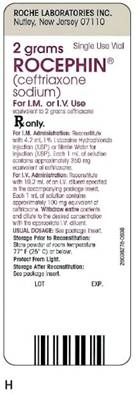
Figure 11-13
Is this order a safe dose for your patient? If it is not a safe dose, what steps should you take?
Ordered: Rocephin 600 mg IV over 30 min bid
On hand: Refer to label H. According to the package insert, for pediatric patients with skin infections, the recommended total daily dose is 50 to 75 mg/kg/day given once a day (or in equally divided doses twice a day). The total daily dose should not exceed 2 g. The Rocephin is reconstituted to a dosage strength of 40 mg/mL.

Figure 11-13
Is this order a safe dose for your patient? If it is not a safe dose, what steps should you take?

فتح الحزمة
افتح القفل للوصول البطاقات البالغ عددها 136 في هذه المجموعة.
فتح الحزمة
k this deck
37
In Exercises 9, determine if the order is safe. If it is, then determine the amount to administer.
The child weighs 30 lb.
Ordered: Depakene syrup 100 mg po q12h
On hand: Depakene syrup 250 mg/5 mL. According to the package insert, the initial daily dose for
pediatric patients is 15 mg/kg/day.
The child weighs 30 lb.
Ordered: Depakene syrup 100 mg po q12h
On hand: Depakene syrup 250 mg/5 mL. According to the package insert, the initial daily dose for
pediatric patients is 15 mg/kg/day.

فتح الحزمة
افتح القفل للوصول البطاقات البالغ عددها 136 في هذه المجموعة.
فتح الحزمة
k this deck
38
In Exercises 17, calculate the daily maintenance fluid needs, based on the following weights. Then find the flow rate in milliliters per hour ( F ) for the DMFN.
39 lb
39 lb

فتح الحزمة
افتح القفل للوصول البطاقات البالغ عددها 136 في هذه المجموعة.
فتح الحزمة
k this deck
39
67 cm and 10 kg

فتح الحزمة
افتح القفل للوصول البطاقات البالغ عددها 136 في هذه المجموعة.
فتح الحزمة
k this deck
40
The patient: 71-year-old male, 5? 10? tall, 193 lb, CL CR of 50 mL/min.
Ordered: Capastat 600 mg IM qd
On hand: Capastat sulfate, diluted to 350 mg/mL
According to the package insert, the estimated daily dosage required to maintain a steady level of drug is 1.29 mg/kg for creatinine clearance of 0 mL/min; 2.43 mg/kg for 10 mL/min; 3.58 mg/kg for 20 mL/min; 4.72 mg/kg for 30 mL/min; 5.87 mg/kg for 40 mL/min; 7.01 mg/kg for 50 mL/min; and 8.16 mg/kg for 60 mL/min.
Ordered: Capastat 600 mg IM qd
On hand: Capastat sulfate, diluted to 350 mg/mL
According to the package insert, the estimated daily dosage required to maintain a steady level of drug is 1.29 mg/kg for creatinine clearance of 0 mL/min; 2.43 mg/kg for 10 mL/min; 3.58 mg/kg for 20 mL/min; 4.72 mg/kg for 30 mL/min; 5.87 mg/kg for 40 mL/min; 7.01 mg/kg for 50 mL/min; and 8.16 mg/kg for 60 mL/min.

فتح الحزمة
افتح القفل للوصول البطاقات البالغ عددها 136 في هذه المجموعة.
فتح الحزمة
k this deck
41
In Exercises 12, determine if the order is safe. If it is, then determine the amount to administer.
The patient is a 4-year-old child who weighs 32 lb. Ordered: Proventil 1 tsp syrup po tid
On hand: Proventil Syrup, 2 mg/5 mL. According to the package insert, for children 2 to 6 years of age, dosing should be initiated at 0.1 mg/kg of body weight 3 times a day. This starting dose should not exceed 2 mg 3 times per day.
The patient is a 4-year-old child who weighs 32 lb. Ordered: Proventil 1 tsp syrup po tid
On hand: Proventil Syrup, 2 mg/5 mL. According to the package insert, for children 2 to 6 years of age, dosing should be initiated at 0.1 mg/kg of body weight 3 times a day. This starting dose should not exceed 2 mg 3 times per day.

فتح الحزمة
افتح القفل للوصول البطاقات البالغ عددها 136 في هذه المجموعة.
فتح الحزمة
k this deck
42
In Exercises 6, use the appropriate formula to calculate the BSA for patients with the following heights and weights.
43 in and 35 lb
43 in and 35 lb

فتح الحزمة
افتح القفل للوصول البطاقات البالغ عددها 136 في هذه المجموعة.
فتح الحزمة
k this deck
43
In Exercises 4, calculate the daily maintenance fluid needs, based on the following weights.
58 lb
58 lb

فتح الحزمة
افتح القفل للوصول البطاقات البالغ عددها 136 في هذه المجموعة.
فتح الحزمة
k this deck
44
You are preparing medication for two patients. Patient A has nosocomial pneumonia and a Creatinine Clearance of 37 mL/min. He has been ordered Zosyn 4.5 gram q6h IV. Patient B has pelvic inflammatory disease and a normal creatinine clearance. She has been ordered 3.375 gram IV q6h. You have the following Zosyn medication vials (see labels E, F, and G.) and package insert information. 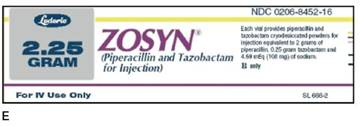

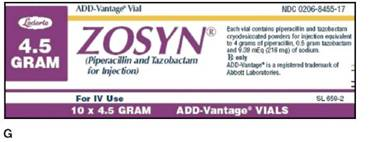
If not safe, what action should you take?



If not safe, what action should you take?

فتح الحزمة
افتح القفل للوصول البطاقات البالغ عددها 136 في هذه المجموعة.
فتح الحزمة
k this deck
45
Answer the following questions.
When would the dose of a medication be calculated on ideal body weight rather than actual weight?
When would the dose of a medication be calculated on ideal body weight rather than actual weight?

فتح الحزمة
افتح القفل للوصول البطاقات البالغ عددها 136 في هذه المجموعة.
فتح الحزمة
k this deck
46
Answer the following questions.
Calculate the safe dosage range for a 66-year-old woman weighing 110 pounds. See label D and package insert information.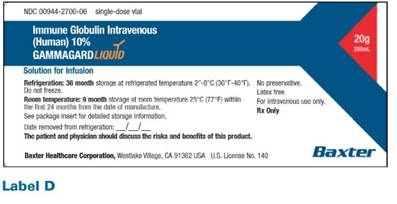
Calculate the safe dosage range for a 66-year-old woman weighing 110 pounds. See label D and package insert information.


فتح الحزمة
افتح القفل للوصول البطاقات البالغ عددها 136 في هذه المجموعة.
فتح الحزمة
k this deck
47
55 in and 74 lb

فتح الحزمة
افتح القفل للوصول البطاقات البالغ عددها 136 في هذه المجموعة.
فتح الحزمة
k this deck
48
The patient: 91-year-old male, 6? 1? tall, 177 lb, CL CR of 54 mL/min.
Ordered: Acyclovir sodium (Zovirax) 750 mg IV q8h infused over 1 hr
On hand: Zovirax for Injection, 50 mg/mL when reconstituted
According to the package insert, the recommended dose for this diagnosis for patients with normal renal function is 10 mg/kg q8h. The dose is adjusted as follows for patients with impaired renal function: For creatinine clearance over 50 mL/min, 100% of the recommended dose every 8 hours; from 25-50 mL/min, 100% of the recommended dose every 12 hours; from 10-25 mL/min, 100% of the recommended dose every 24 hours; for 0-10 mL/min, 50% of the recommended dose every 24 hours.
Ordered: Acyclovir sodium (Zovirax) 750 mg IV q8h infused over 1 hr
On hand: Zovirax for Injection, 50 mg/mL when reconstituted
According to the package insert, the recommended dose for this diagnosis for patients with normal renal function is 10 mg/kg q8h. The dose is adjusted as follows for patients with impaired renal function: For creatinine clearance over 50 mL/min, 100% of the recommended dose every 8 hours; from 25-50 mL/min, 100% of the recommended dose every 12 hours; from 10-25 mL/min, 100% of the recommended dose every 24 hours; for 0-10 mL/min, 50% of the recommended dose every 24 hours.

فتح الحزمة
افتح القفل للوصول البطاقات البالغ عددها 136 في هذه المجموعة.
فتح الحزمة
k this deck
49
In Exercises 13, determine if the order is safe. If it is, then determine the amount to administer.
The patient is a 3-year old child who weighs 32 lb and has a severe infection. Ordered: Amoxicillin 750 mg PO q8h
On hand: Refer to label A. According to the package label, the dosing regimen for children is 20 to 40 mg/ kg/day q8h.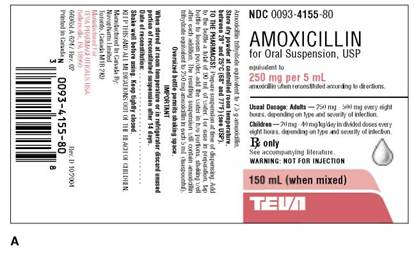
The patient is a 3-year old child who weighs 32 lb and has a severe infection. Ordered: Amoxicillin 750 mg PO q8h
On hand: Refer to label A. According to the package label, the dosing regimen for children is 20 to 40 mg/ kg/day q8h.


فتح الحزمة
افتح القفل للوصول البطاقات البالغ عددها 136 في هذه المجموعة.
فتح الحزمة
k this deck
50
In Exercises 7, use the appropriate formula to calculate the BSA for patients with the following heights and weights.
22 in and 18 lb
22 in and 18 lb

فتح الحزمة
افتح القفل للوصول البطاقات البالغ عددها 136 في هذه المجموعة.
فتح الحزمة
k this deck
51
In Exercises 5, calculate the daily maintenance fluid needs, based on the following weights.
121 lb
121 lb

فتح الحزمة
افتح القفل للوصول البطاقات البالغ عددها 136 في هذه المجموعة.
فتح الحزمة
k this deck
52
Answer the following questions.
List four age-related factors that may affect the dosage of a medication for a pediatric patient.
List four age-related factors that may affect the dosage of a medication for a pediatric patient.

فتح الحزمة
افتح القفل للوصول البطاقات البالغ عددها 136 في هذه المجموعة.
فتح الحزمة
k this deck
53
In Exercises 10, determine if the order is safe. If it is, then determine the amount to administer.
The patient is a 4-year-old child who weighs 16 kg. Ordered: Ventolin syrup 1.6 mg po tid
On hand: Ventolin syrup 2 mg/5 mL. According to the package insert, for children from 2 to 6 years of age, dosing should be initiated at 0.1 mg/kg of body weight 3 times a day. This starting dosage should not exceed 2 mg 3 times a day.
The patient is a 4-year-old child who weighs 16 kg. Ordered: Ventolin syrup 1.6 mg po tid
On hand: Ventolin syrup 2 mg/5 mL. According to the package insert, for children from 2 to 6 years of age, dosing should be initiated at 0.1 mg/kg of body weight 3 times a day. This starting dosage should not exceed 2 mg 3 times a day.

فتح الحزمة
افتح القفل للوصول البطاقات البالغ عددها 136 في هذه المجموعة.
فتح الحزمة
k this deck
54
In Exercises 18, calculate the daily maintenance fluid needs, based on the following weights. Then find the flow rate in milliliters per hour ( F ) for the DMFN.
110 lb (The patient has taken 800 mL fluid orally.)
In Exercises 19-24, determine if the dosage ordered is safe. If the order is safe, then find the amount to administer. Assume that the patients have impaired renal functions.
110 lb (The patient has taken 800 mL fluid orally.)
In Exercises 19-24, determine if the dosage ordered is safe. If the order is safe, then find the amount to administer. Assume that the patients have impaired renal functions.

فتح الحزمة
افتح القفل للوصول البطاقات البالغ عددها 136 في هذه المجموعة.
فتح الحزمة
k this deck
55
29 in and 19 lb

فتح الحزمة
افتح القفل للوصول البطاقات البالغ عددها 136 في هذه المجموعة.
فتح الحزمة
k this deck
56
The patient: 85-year-old female, 5? 2? tall, 126 lb, CL CR of 37 mL/min, diagnosed with a complicated urinary tract infection.
Ordered: Fortaz 500 mg IV q12h
On hand: Fortaz for injection, reconstituted at 10 mg/mL
According to the package insert, the usual recommended dosage for patients with complicated urinary tract infections is 500 mg-1 g given q8-12h. For patients with renal insufficiency, the following maintenance dosages are recommended (however, if the usual dosage is less, administer the lower amount): for creatinine clearance of 31-50 mL/min, 1 g q12h; for 16-30 mL/min, 1 g q24h; for 6-15 mL/min, 500 mg q24h; for less than 5 mL/min, 500 mg q48h.
Ordered: Fortaz 500 mg IV q12h
On hand: Fortaz for injection, reconstituted at 10 mg/mL
According to the package insert, the usual recommended dosage for patients with complicated urinary tract infections is 500 mg-1 g given q8-12h. For patients with renal insufficiency, the following maintenance dosages are recommended (however, if the usual dosage is less, administer the lower amount): for creatinine clearance of 31-50 mL/min, 1 g q12h; for 16-30 mL/min, 1 g q24h; for 6-15 mL/min, 500 mg q24h; for less than 5 mL/min, 500 mg q48h.

فتح الحزمة
افتح القفل للوصول البطاقات البالغ عددها 136 في هذه المجموعة.
فتح الحزمة
k this deck
57
In Exercises 14, determine if the order is safe. If it is, then determine the amount to administer.
The patient is a 7-year-old child who weighs 52 lb.
Ordered: Ranitidine 30 mg IV q8h
On hand: Refer to labels B and C.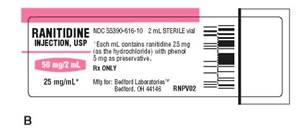
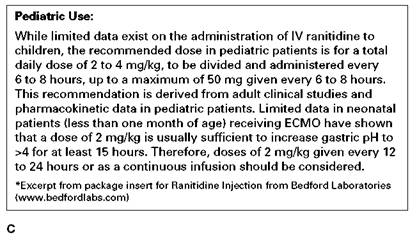
The patient is a 7-year-old child who weighs 52 lb.
Ordered: Ranitidine 30 mg IV q8h
On hand: Refer to labels B and C.



فتح الحزمة
افتح القفل للوصول البطاقات البالغ عددها 136 في هذه المجموعة.
فتح الحزمة
k this deck
58
In Exercises 8, use the appropriate formula to calculate the BSA for patients with the following heights and weights.
26 in and 21 lb
26 in and 21 lb

فتح الحزمة
افتح القفل للوصول البطاقات البالغ عددها 136 في هذه المجموعة.
فتح الحزمة
k this deck
59
In Exercises 6, find the microdrip tubing flow rate for DMFN for patients, based on the following weights.
21 kg
21 kg

فتح الحزمة
افتح القفل للوصول البطاقات البالغ عددها 136 في هذه المجموعة.
فتح الحزمة
k this deck
60
In Exercises 3, convert the following weights to kilograms.
6 lb 9 oz
6 lb 9 oz

فتح الحزمة
افتح القفل للوصول البطاقات البالغ عددها 136 في هذه المجموعة.
فتح الحزمة
k this deck
61
Answer the following questions.
Explain why a medication dosage may be altered based on the patient's result of a creatine clearance test
Explain why a medication dosage may be altered based on the patient's result of a creatine clearance test

فتح الحزمة
افتح القفل للوصول البطاقات البالغ عددها 136 في هذه المجموعة.
فتح الحزمة
k this deck
62
Answer the following questions.
If the order was for 15 grams of this drug, what amount would you administer? See label D and package insert information.
Gammagard Liquid package insert information:
Monthly doses of approximately 00 - 600 mg/kg infused at 3 to 4 week intervals are commonly used.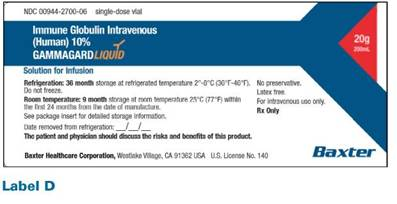
If the order was for 15 grams of this drug, what amount would you administer? See label D and package insert information.
Gammagard Liquid package insert information:
Monthly doses of approximately 00 - 600 mg/kg infused at 3 to 4 week intervals are commonly used.


فتح الحزمة
افتح القفل للوصول البطاقات البالغ عددها 136 في هذه المجموعة.
فتح الحزمة
k this deck
63
88.5 cm and 15.75 kg

فتح الحزمة
افتح القفل للوصول البطاقات البالغ عددها 136 في هذه المجموعة.
فتح الحزمة
k this deck
64
The patient: 68-year-old female, 4? 11? tall, 120 lb, CL CR of 29 mL/min. The patient does not have a life-threatening infection.
Ordered: Mandol 1 g IV q8h
On hand: Mandol reconstituted to 1 g/10 mL
According to the package insert, for patients with renal impairment and less severe infections, the following maintenance dosages are recommended: for creatinine clearance of more than 80 mL/min, 1-2 g q6h; for 50-80 mL/min, 0.75-1.5 g q6h; for 25-50 mL/min, 0.75-1.5 g q8h; for 10-25 mL/min, 0.5-1 g q8h; for 2-10 mL/min, 0.5-0.75 g q12h, for less than 2 mL/min, 0.25-0.5 g q12h.
Ordered: Mandol 1 g IV q8h
On hand: Mandol reconstituted to 1 g/10 mL
According to the package insert, for patients with renal impairment and less severe infections, the following maintenance dosages are recommended: for creatinine clearance of more than 80 mL/min, 1-2 g q6h; for 50-80 mL/min, 0.75-1.5 g q6h; for 25-50 mL/min, 0.75-1.5 g q8h; for 10-25 mL/min, 0.5-1 g q8h; for 2-10 mL/min, 0.5-0.75 g q12h, for less than 2 mL/min, 0.25-0.5 g q12h.

فتح الحزمة
افتح القفل للوصول البطاقات البالغ عددها 136 في هذه المجموعة.
فتح الحزمة
k this deck
65
In Exercises 15, determine if the order is safe. If it is, then determine the amount to administer.
The patient is an 8-year-old child who weighs 55 lb and is being treated for streptococcal pharnygitis.
Ordered: Cephalexin Susp. 200 mg PO q6h
On hand: See label D and package insert information E below.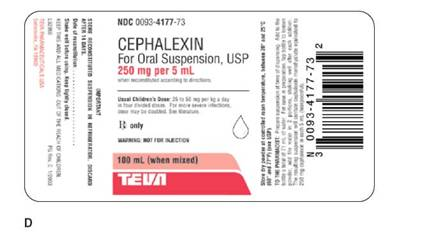
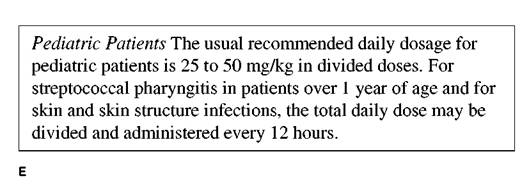
The patient is an 8-year-old child who weighs 55 lb and is being treated for streptococcal pharnygitis.
Ordered: Cephalexin Susp. 200 mg PO q6h
On hand: See label D and package insert information E below.



فتح الحزمة
افتح القفل للوصول البطاقات البالغ عددها 136 في هذه المجموعة.
فتح الحزمة
k this deck
66
In Exercises 9, calculate the recommended dosage in the appropriate unit.
The child's BSA is 0.82 m 2. The recommended dosage is 175 mcg/m 2.
The child's BSA is 0.82 m 2. The recommended dosage is 175 mcg/m 2.

فتح الحزمة
افتح القفل للوصول البطاقات البالغ عددها 136 في هذه المجموعة.
فتح الحزمة
k this deck
67
In Exercises 7, find the microdrip tubing flow rate for DMFN for patients, based on the following weights.
15 kg
15 kg

فتح الحزمة
افتح القفل للوصول البطاقات البالغ عددها 136 في هذه المجموعة.
فتح الحزمة
k this deck
68
You are preparing medication for two patients. Patient A has nosocomial pneumonia and a Creatinine Clearance of 37 mL/min. He has been ordered Zosyn 4.5 gram q6h IV. Patient B has pelvic inflammatory disease and a normal creatinine clearance. She has been ordered 3.375 gram IV q6h. You have the following Zosyn medication vials (see labels E, F, and G.) and package insert information. 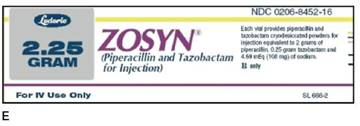

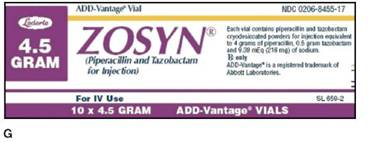
According to the package insert, you further dilute each medication with 150 mL of sterile water for injection. What would the IV flow rate be in mL per hour for administration of the medication to Patient A and B?



According to the package insert, you further dilute each medication with 150 mL of sterile water for injection. What would the IV flow rate be in mL per hour for administration of the medication to Patient A and B?

فتح الحزمة
افتح القفل للوصول البطاقات البالغ عددها 136 في هذه المجموعة.
فتح الحزمة
k this deck
69
In Exercises 11, determine if the order is safe. If it is, then determine the amount to administer.
The patient is 72 cm tall and weighs 16 kg. Ordered: Oncaspar 1300 IU IM every 14 days
On hand: Oncaspar 5 mL/vial, 750 IU/mL. The recommended pediatric dosage is 2500 IU/m 2 for children whose BSA is greater than or equal to 0.6 m 2 and 82.5 IU/kg for children whose BSA is less than 0.6 m 2.
The patient is 72 cm tall and weighs 16 kg. Ordered: Oncaspar 1300 IU IM every 14 days
On hand: Oncaspar 5 mL/vial, 750 IU/mL. The recommended pediatric dosage is 2500 IU/m 2 for children whose BSA is greater than or equal to 0.6 m 2 and 82.5 IU/kg for children whose BSA is less than 0.6 m 2.

فتح الحزمة
افتح القفل للوصول البطاقات البالغ عددها 136 في هذه المجموعة.
فتح الحزمة
k this deck
70
In Exercises 19, determine if the dosage ordered is safe. If the order is safe, then find the amount to administer. Assume that the patients have impaired renal functions.
The patient: 85-year-old male, 6 ft 1 in. tall, 210 lb, CL CR of 64 mL/min. Ideal weight should be 195 lb.
Ordered: Cartrol 2.5 mg po q24h
On hand: Cartrol 2.5 mg/tablet
According to the package insert, the usual dosage interval for 2.5 mg is as follows: for patients with creatinine clearance above 60 mL/min, 24 h; for 20 to 60 mL/min, 48 h; and for less than 20 mL/min, 72 h.
The patient: 85-year-old male, 6 ft 1 in. tall, 210 lb, CL CR of 64 mL/min. Ideal weight should be 195 lb.
Ordered: Cartrol 2.5 mg po q24h
On hand: Cartrol 2.5 mg/tablet
According to the package insert, the usual dosage interval for 2.5 mg is as follows: for patients with creatinine clearance above 60 mL/min, 24 h; for 20 to 60 mL/min, 48 h; and for less than 20 mL/min, 72 h.

فتح الحزمة
افتح القفل للوصول البطاقات البالغ عددها 136 في هذه المجموعة.
فتح الحزمة
k this deck
71
24.5 in and 11.3 lb

فتح الحزمة
افتح القفل للوصول البطاقات البالغ عددها 136 في هذه المجموعة.
فتح الحزمة
k this deck
72
The patient: 82-year-old male, 5? 7? tall, 186 lb, CL CR of 72 mL/min.
Ordered: Timentin 3 g IV q4h
On hand: Timentin reconstituted to 20 mg/mL
According to the package insert, for patients with renal impairment, the following maintenance dosages are recommended: for creatinine clearance over 60 mL/min, 3.1 g q4h; for 30 to 60 mL/min, 2 g q4h; for 10 to 30 mL/min, 2 g q8h; for less than 10 mL/min, 2 g q12h. For patients with more advanced impairments, lower dosages are recommended.
Ordered: Timentin 3 g IV q4h
On hand: Timentin reconstituted to 20 mg/mL
According to the package insert, for patients with renal impairment, the following maintenance dosages are recommended: for creatinine clearance over 60 mL/min, 3.1 g q4h; for 30 to 60 mL/min, 2 g q4h; for 10 to 30 mL/min, 2 g q8h; for less than 10 mL/min, 2 g q12h. For patients with more advanced impairments, lower dosages are recommended.

فتح الحزمة
افتح القفل للوصول البطاقات البالغ عددها 136 في هذه المجموعة.
فتح الحزمة
k this deck
73
In Exercises 16, determine if the order is safe. If it is, then determine the amount to administer.
The patient is a 44-lb child who is years old.
years old.
Ordered: Tolectin 100 mg po qid
On hand: Tolectin 200-mg scored tablets. The package insert indicates that for children 2 years and older, the usual dose ranges from 15 to 30 mg/kg/day.
The patient is a 44-lb child who is
 years old.
years old.Ordered: Tolectin 100 mg po qid
On hand: Tolectin 200-mg scored tablets. The package insert indicates that for children 2 years and older, the usual dose ranges from 15 to 30 mg/kg/day.

فتح الحزمة
افتح القفل للوصول البطاقات البالغ عددها 136 في هذه المجموعة.
فتح الحزمة
k this deck
74
In Exercises 10, calculate the recommended dosage in the appropriate unit.
The child's BSA is 0.65 m 2. The recommended dosage is 0.4 mg/m 2.
The child's BSA is 0.65 m 2. The recommended dosage is 0.4 mg/m 2.

فتح الحزمة
افتح القفل للوصول البطاقات البالغ عددها 136 في هذه المجموعة.
فتح الحزمة
k this deck
75
In Exercises 8, find the microdrip tubing flow rate for DMFN for patients, based on the following weights.
17 lb
17 lb

فتح الحزمة
افتح القفل للوصول البطاقات البالغ عددها 136 في هذه المجموعة.
فتح الحزمة
k this deck
76
Answer the following questions.
List four age-related factors that may affect the dosage of a medication for a geriatric patient.
List four age-related factors that may affect the dosage of a medication for a geriatric patient.

فتح الحزمة
افتح القفل للوصول البطاقات البالغ عددها 136 في هذه المجموعة.
فتح الحزمة
k this deck
77
Answer the following questions.
Define the term polypharmacy and explain how it would increase the risk of drug interactions in a geriatric patient.
Define the term polypharmacy and explain how it would increase the risk of drug interactions in a geriatric patient.

فتح الحزمة
افتح القفل للوصول البطاقات البالغ عددها 136 في هذه المجموعة.
فتح الحزمة
k this deck
78
Answer the following questions.
Using the blank nomogram, label E and the package insert information, calculate the correct dosage for a 5 ' 8 " tall, 70-year-old man weighing 170 pounds.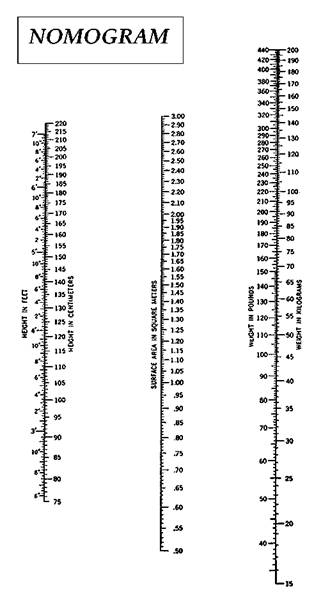
Camptosar package insert information
CAMPTOSAR 180 mg/m 2 as 90-minute infusion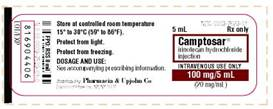
Label E
Using the blank nomogram, label E and the package insert information, calculate the correct dosage for a 5 ' 8 " tall, 70-year-old man weighing 170 pounds.

Camptosar package insert information
CAMPTOSAR 180 mg/m 2 as 90-minute infusion

Label E

فتح الحزمة
افتح القفل للوصول البطاقات البالغ عددها 136 في هذه المجموعة.
فتح الحزمة
k this deck
79
In Exercises 11-14, calculate the child's daily maintenance fluid needs (DMFN) based on the following weights. Then find the microdrip tubing flow rate for DMFN.
11. 36 kg
11. 36 kg

فتح الحزمة
افتح القفل للوصول البطاقات البالغ عددها 136 في هذه المجموعة.
فتح الحزمة
k this deck
80
In Exercises 1, convert the following weights to kilograms. Rounding to the nearest hundredth.
66 lb
66 lb

فتح الحزمة
افتح القفل للوصول البطاقات البالغ عددها 136 في هذه المجموعة.
فتح الحزمة
k this deck








